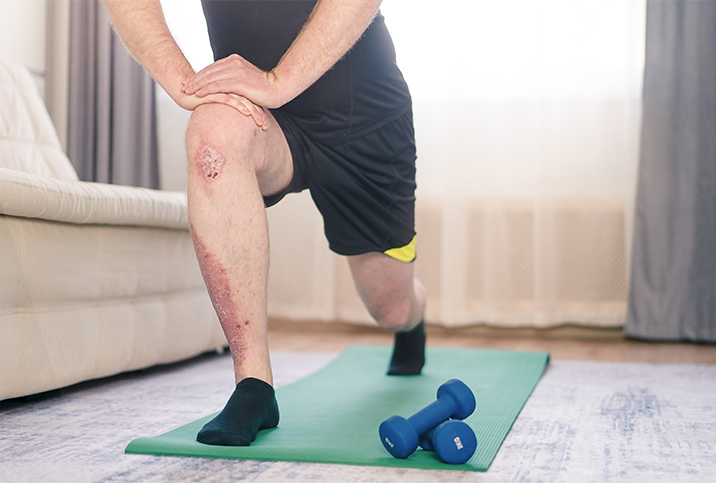Yes, You Can Get Psoriasis on Your Penis

Psoriasis affects more than 3 percent of American adults. Of those people, up to two-thirds have experienced flare-ups on their genitals.
Sex is, by nature, an intimate experience. If you have psoriasis on your penis, getting naked with someone likely feels incredibly vulnerable. Psoriatic plaques on genital skin can also make sex physically uncomfortable.
How can you work through the condition and still enjoy a healthy, pleasurable sex life?
What is genital psoriasis?
The first thing to know is psoriasis is a chronic, autoimmune skin disease. That means it is not contagious. It cannot be transmitted to a partner during intimate activity.
"Psoriasis can affect any skin surface, including vaginal, scrotal and penile skin," said Anar Mikailov, M.D., a Boston-based dermatologist with Rochester Regional Health in New York and co-founder of Skintensive, a skincare product company.
He described genital psoriasis as red, often itchy, and sometimes painful.
Psoriasis on other body parts usually causes thickened, scaly patches, but psoriasis on the head of the penis or the penile shaft can look and feel slightly different. Skin is thinner there, after all.
Psoriasis on the penis causes skin plaques "as thin as rice paper," leading to tiny cuts along the penis shaft and tip, according to Melodie Young, M.S.N., a board-certified dermatology nurse practitioner at Mindful Dermatology in Dallas.
"The scrotum and mons pubis are often also affected, and unlike the penis, will have thickened, inflamed patches," she added.
These patches can be painful and itchy.
Deal with the impact of psoriasis on intimacy
The effects of genital psoriasis are more than skin deep. Psoriasis on the penis can make sex hurt. The friction and appearance-related anxiety—a psoriasis trigger—can lead some patients to avoid sexual activity altogether.
"I have had men tell me they won't even sleep in the bed with their partner because any arousal will stretch the skin, creating rips," Young said.
The good news is that though psoriasis is chronic, a diagnosis doesn't have to doom your sex life.
"People with genital psoriasis do not need to avoid sex," said Sonya Kenkare, M.D., a board-certified dermatologist at Rush University Medical Center in Chicago.
Proper treatment can control the condition, reducing discomfort and visible signs of psoriasis, she said.
The first step toward relief is to see a dermatologist who can pinpoint a treatment plan for your body and lifestyle. Prescription treatments include steroid or nonsteroid creams, oral medications or, in some cases, injections.
Once you have a treatment plan, stick to it.
"The time required to repair and prepare the skin for the next sexual encounter will be days to weeks," Young explained.
Communication is key
Talking openly about sex can boost sexual satisfaction in general. However, discussing the appearance of your penis might not be easy. Explaining that psoriasis is not contagious might feel uncomfortable, especially with a new partner.
It's difficult, yes, but it's also important.
"Open discussion about what is happening on the skin in the general area really helps to build intimacy between partners, but also to help explain what's going on and reduce self-consciousness," Kenkare said.
Communicating how certain positions or acts feel during a flare-up is also vital for your comfort and pleasure. You might need to use more lubricant or avoid penetration when your penis is itchy or inflamed.
Minimize side effects and enjoy sex again
If genital psoriasis is something you deal with regularly or even intermittently, the experts have a few tips to help keep your sex life active and comfortable.
Moisturize genital skin
You should try a few products to find the ointment or cream that works best for your skin.
"There are over-the-counter moisturizers that have ingredients like tar or salicylic acid that can specifically target psoriasis," Kenkare said.
Tackle inflammation beforehand
The last thing you want before a sexy evening is an itchy or tender penis. Sometimes a few minutes with a cold compress helps. Kenkare also suggested trying Neutrogena T/Gel therapeutic shampoo. This tar-based product can reduce itchiness and irritation. Apply it to the penis skin, leave it for five minutes and then rinse it.
Get liberal with lube
"Use lubricant liberally and with every time friction will be involved," Young said.
Opt for lubricants without parabens, petroleum jelly, glycerin and nonoxynol-9. Remember that oil-based lubes are not compatible with condoms.
Prevent excessive penile friction
"Some patients note psoriasis that worsens after intercourse due to the increased friction," said Danilo C. Del Campo, M.D., a board-certified dermatologist at Chicago Skin Clinic.
He suggested minimizing friction by using lubrication, protecting your penis with a condom or even abstaining from intercourse until medical treatments have time to work.
Monitor for irritation
Patients with penile psoriasis can use standard products as long as they're not irritating, Kenkare said. Del Campo recommended using fragrance-free skincare products—body wash, moisturizing ointment, lubes—designed for sensitive skin.
Tackle the root of the problem
Increasing lubrication, minimizing friction and switching to gentle skincare products can help reduce pain and itchiness, but remember that these strategies won't get to the root of the problem. No over-the-counter treatments can tackle your psoriasis like prescription therapy, Mikailov explained.
With an effective treatment plan, psoriasis flares on your penis will become less and less common.
"I tell patients that my goal for them is to get them as clear as possible, and yes, 100 percent clear is an achievable goal for most patients," Del Campo said.
Obviously, seeing your doctor is important for managing psoriasis, on your penis or anywhere else on your body.


















